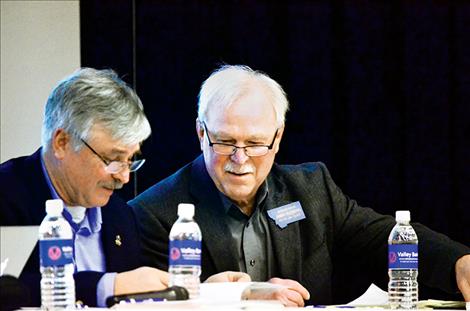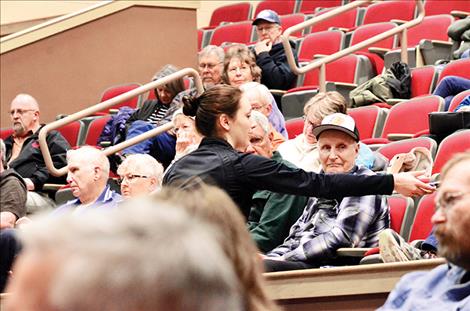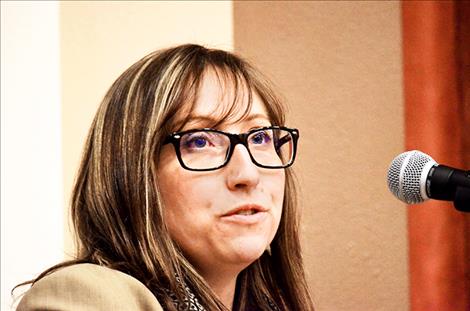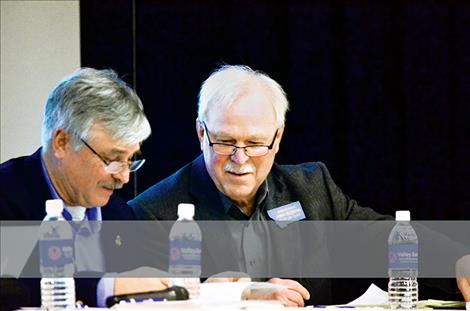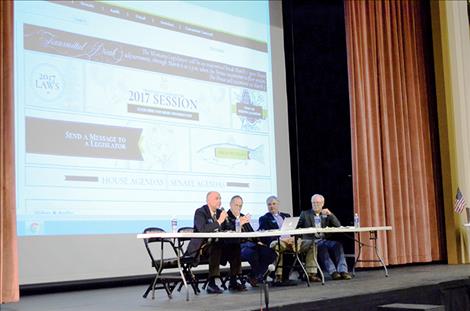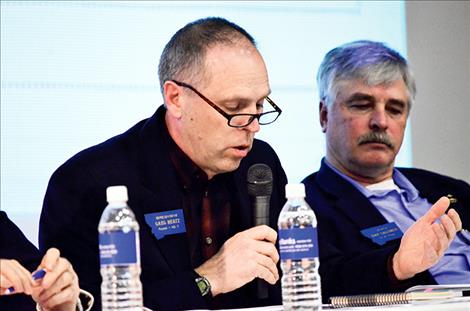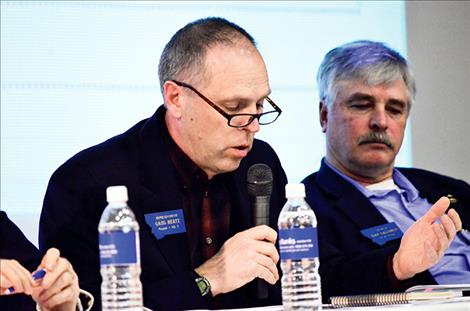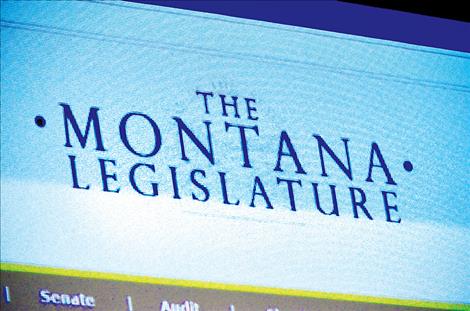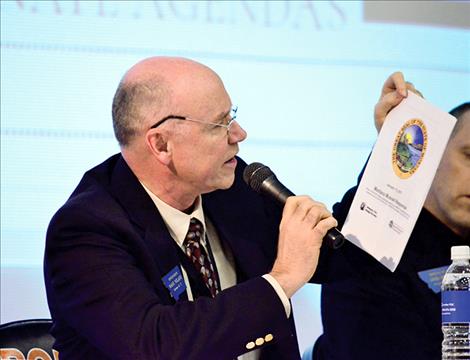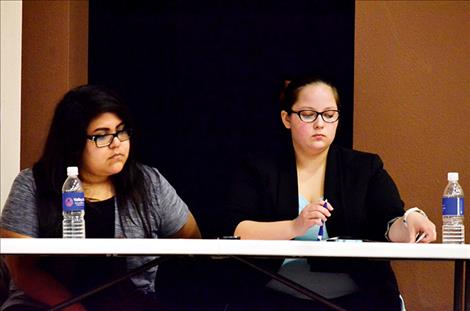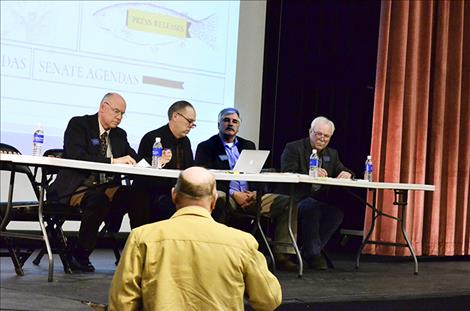Students host friendly political forum
Hey savvy news reader! Thanks for choosing local.
You are now reading
1 of 3 free articles.
RONAN — In an effort to show students that it’s okay to disagree about politics, four Montana legislators, three Republicans and one Democrat answered questions about current issues including invasive species, Public Law 280, and election ballots.
“It’s great that the kids get involved and help set the tone for civil discourse,” teacher Jessica Johnson said. “They get to see that people don’t have to be enemies at the end of the day when they don’t agree on things.”
On Friday, the Lake County delegation to the Montana Legislature took their seats on the stage at the Ronan Performing Arts center and answered questions for two hours. About 50 adult community members and 35 Ronan High School students attended the event. The Democratic Central Committee and the Lake County Republican Women also helped organize the event.
The students collected questions on note cards, wrote some of their own, and handed them to Johnson, and she read them to the legislators. A few people elected to ask questions directly to the panel. The legislators included Rep. Mark Noland (R-Bigfork), Rep. Greg Hertz (R-Polson), Rep. Dan Salomon (R-Ronan) and Rep. John Fleming (DSt. Ignatius).
Before the questions began, Johnson was recognized as the 27th Montana Statehood Centennial Bell Award winner for her work as a history teacher in Ronan. She thanked the audience for the recognition, and then, she outlined the rules for the forum, which included limiting questions to 30 seconds to allow everyone to have a chance to ask a question.
Aquatic invasive species were a bipartisan topic during the night. Rep. Noland said zebra mussels and quagga mussels are a “big threat” to local waters, so several bills are working their way through the legislature.
“I don’t want to scare anybody but it’s going to take a big effort,” Noland said of preventing the mussels from invading.
Rep. Noland said that once the mussels invade, they are “impossible” to remove. “There is almost nothing that can be done,” he said. “That’s why this is so important. It’s so vital that we don’t get it here.”
Rep. Hertz said it’s going to cost Montana about $10 million for a few years of prevention to try and keep the mussels from spreading across the state. He said part of that money will come from the federal government but the rest will have to be picked up through things like launch fees and boat stickers and other revenue sources, which is why Rep. Noland wasn’t kidding when he asked if anyone had an extra million dollars laying around to prevent an outbreak. “Anyone know Oprah or Bill Gates? It’s time to ask (for money). We need help,” Noland said.
Rep. Fleming said mussels weren’t an issue two years ago, so science hasn’t caught up with contamination, which means there are no real measures for cleaning up the problem. He said delay tactics are the best thing the State of Montana can do right now.
Public Law 280 was another issue of discussion. The law mandates that states have jurisdiction over law enforcement on reservations. Rep. Hertz introduced a bill to the legislature that would require Montana to reimburse counties for the cost of enforcing the federal law. He said he knew it would fail because the state is facing a tight budget, but he wanted to bring it to the legislature and make people aware of the issue.
Lake County Commissioner Gale Decker asked the board about Public Law 280. He said that the law allows CSKT to withdraw from the agreement after a consultation. He asked why it was so much more difficult for the county to get out of the agreement? And he asked the representatives to consider making the process easy for both sides. Rep. Hertz said that even if the tribe elects to withdraw from the agreement, the issue still has to go through the federal government for approval.
Lake County Commissioner Dave Stipe said county officials are trying to end Public Law 280 in the county to reduce the burden of law enforcement costs to property tax payers in the county.
The Montana budget was considered. A member of the public stated that increasing the tax on cigarettes, income over $400,000, and the gas tax might be ways to fix the budget problems. Rep. Hertz said he felt that a tax increase wouldn’t make it through the legislature. He did think a gas tax was an option. Rep. Noland said industries like agriculture, timber and coal were producing less in the state, and more jobs are being created in government, which leaves less money available to the state.
Rep. Fleming said the state needs to raise revenue, be more efficient, and decrease spending. Rep. Salomon said a gas tax would be “hard to swallow,” but it would bring in revenue from out-of-state travelers. He also said a gas tax affects more low-income people, and a sales tax might be a fair option.
“People across Montana never like it,” Salomon said of a sales tax. “But if we turn into a tourism state, we need to think about it.”
Lake County Commissioner Dave Stipe addressed the panel and said that a gas tax increase wouldn’t help the county. He said taxes collected on the reservation for the Montana Department of Transportation from gas taxes are given to the tribe.
In other discussion, Montana Congressman Ryan Zinke’s appointment as the new United States Secretary of the Interior leaves a position open in congress, so an unexpected election needs to be funded by each county, and a mail-in ballot is considerably cheaper.
Rep. Salomon said that going to the election polls would cost Lake County about $50,000 and a mail-in ballot would cost about $19,000. “We’ve done mail in ballots for years in the sense of school board election and school bond elections,” he said. “We just thought it was a good thing.” Rep. Salomon said a bill to allow a mail-in election passed the Montana legislature. Hertz said there are 85 days left to get the election finished. And Fleming said he preferred a short campaign cycle. Students stacked up the chairs after the event. Tristan Thingelstad, Ronan senior, said he has been paying attention to the legislature. He comes from an agriculture based family and feels many of the issues affect his future.
Ronan senior Jenaya Burns said she felt the panel answered her questions for the most part but she would have liked more discussion on some issues. She said the discussion on mussels was really interesting.
“It’s a big issue, and we need to take action, but I don’t know anyone with a million dollars,” Burns said. “I hope someone does.”
















